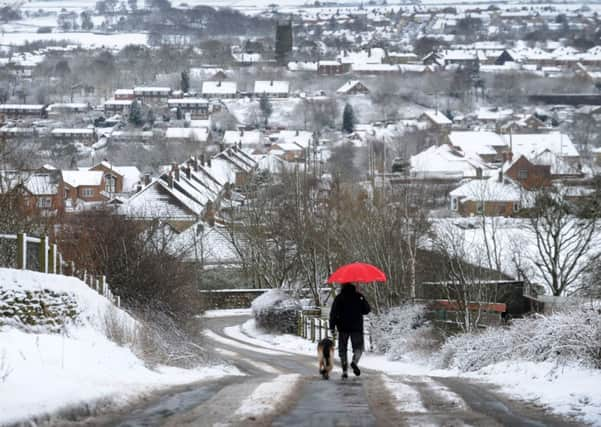Andrew Vine: Snow in winter? Time to act like headless chickens


So why is it, with the absolute certainty of night following day, when the skies darken and the snow begins to drift down, so many people behave with all the rational calmness of a headless chicken?
Barely had the first few flakes started to settle on the road than my mobile began ringing with calls from people saying they could not possibly make it to meetings because it was snowing.
Advertisement
Hide AdAdvertisement
Hide AdThe other variation on this theme was, of course, appointments for later in the day being cancelled on the grounds of being worried about becoming stuck and not making it home.
By the time mid-afternoon arrived, the evening rush hour was under way as office workers abandoned their desks early in a race against time to beat another possible snowfall.
Despite the roads having been gritted, and cleared both of snow and ice, drivers were crawling along at a fraction of their normal speed, hunched tensely over the wheel, saucer-eyed with anxiety.
Obviously we’re in the midst of a nasty spell of weather which has made life difficult and even dangerous for a lot of people, but even so we seem to have developed a sort of collective paranoia so severe that it doesn’t even need to be snowing for panic to set in.
Advertisement
Hide AdAdvertisement
Hide AdIn the middle of a meeting I was attending, one of the other people present broke off to answer her mobile.
Her brow furrowed, she finished the call and began gathering up overcoat, scarf and hat. “What’s wrong?” she was asked. “It’s my husband. He says it’s looking very grey over where we live, so I’d better set off now.”
But is it actually snowing? “No, but it might,” she replied over her shoulder as she shot out of the door.
She wasn’t alone. A male colleague swaddling himself up so comprehensively that he might have been heading for the Arctic Circle rather than Harrogate waxed long and loud about how snow spooked him, which rather begged the question why he spends a small fortune on going skiing every year.
Advertisement
Hide AdAdvertisement
Hide AdIt isn’t just the drivers. A forecast of snow sends commuters scurrying to railway and bus stations where desperate crowds throng the platforms as if fleeing before an invading army.
But as we all know to our cost, public transport is often as jittery about snow as the nervous driver with a vacuum flask, blanket and shovel in the boot.
If I were a betting man, I’d stake this month’s mortgage money on the appearance of that perennial winter favourite – “the wrong sort of snow” – any time now. Expect it to be cited as the cause of chaos and normal life grinding to a halt.
We surely used to cope with winter weather better than we do now. A few years ago, whilst I was escorting a visitor from Romania around Yorkshire, a short-lived cold snap brought everything to a standstill.
Advertisement
Hide AdAdvertisement
Hide AdSchools shut, trains stopped, workplaces were half-empty, and the roads deserted.
Our visitor regarded all this with a mixture of bewilderment and amusement. Where he lived, winter sent temperatures plummeting to around the minus-20C mark, and blanketed everything in a foot or more of snow which froze solid.
He and his countrymen simply wrapped up, shrugged their shoulders and got on with the business of going to work or school. Life proceeded at a slightly slower pace than normal as they skidded, slipped and dug out, but nothing stopped.
Here though, a dusting of snow as light as that of icing sugar on a cake is enough to induce mass twitchiness and speculation that we are about to be hit by conditions to rival the notorious freezes of 1963 or 1947, even among those too young to remember either.
Advertisement
Hide AdAdvertisement
Hide AdJourneys home that take half-an-hour longer than usual because the traffic is going at a snail’s pace are spoken of in terms that imply an ordeal comparable to that of Captain Scott and his men during the last fatal blizzard in the Antarctic has been survived.
It wasn’t always so. We used to curse and complain about snow and ice, and then just get on with everyday life, staying at work until it was time to go home, not fleeing early or ringing in to say we couldn’t possibly get there. The trains still ran and buses ploughed on through the slush.
But we’re not as hardy as that any more. We’ve become a nation of softies when it comes to winter. It’s probably because we’ve got used to being cosseted by central heating – far less common in homes a couple of generations ago – and cars that more than ever insulate us from the world outside.
It’s winter. It’s going to snow. Let’s return to saying “so what?” dig ourselves out and just get on with normal life.